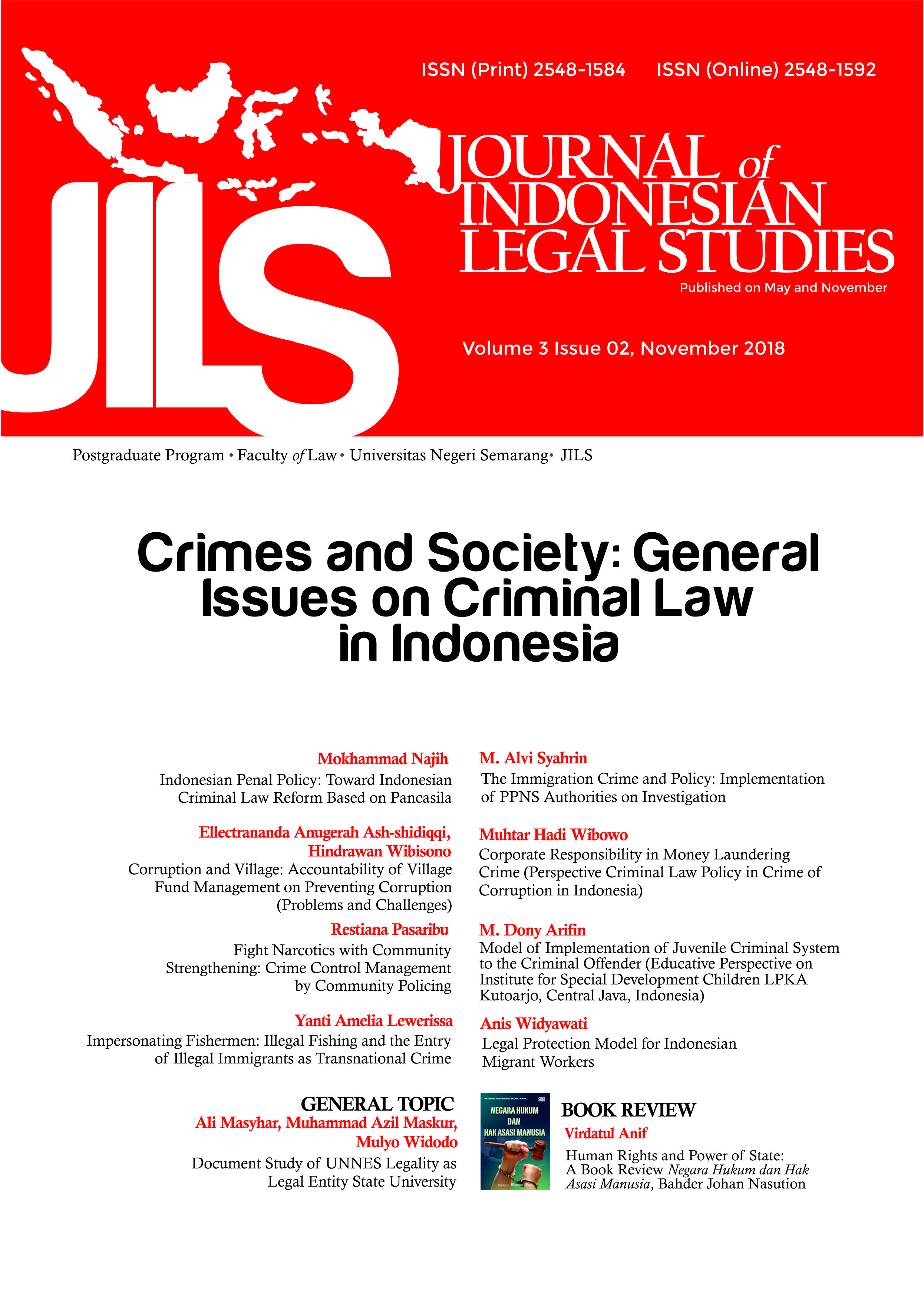Legal Protection Model for Indonesian Migrant Workers
Main Article Content
Abstract
The emergence of several large cases of migrant workers in Malaysia and Singapore as well as in several Middle Eastern countries, especially Saudi Arabia, made all the nation's components flinch. Many people argue that the problem occurs because of the low level of education of migrant workers. There are also those who say that this problem occurs because employers of Indonesian labor services companies (Pengerah Jasa Penyalur Tenaga Kerja Indonesia, PJTKI, now called Perusahaan Penyalur Tenaga Kerja Indonesia Swasta, PPTKIS) are not nationally minded and only pursue profit (profit-oriented). There were also those who argued that the cases of migrant workers occurred due to the inactivity of regulative and punitive functions of the Government of the Republic of Indonesia. Based on the background above, the problem can be formulated is how the urgency of legal protection for Indonesian migrant workers abroad and how the legal protection model for Indonesian migrant workers abroad. Research carried out at BP3TKI and the Semarang Manpower and Transmigration Office underlined that legal protection for Indonesian migrant workers abroad is very important. The urgency in legal protection due to fulfillment of the rights of victims who work legally abroad but also cannot be fully implemented properly, due to differences in legal systems with migrant workers recipient countries that do not necessarily want to protect the rights of migrant workers who experience treatment not please from their own citizens. The migrant workers who work illegally the government has not been able to fully protect the rights of victims who have experienced criminal acts. The legal protection model for migrant workers currently emphasizes the fulfillment of victims’ rights who work legally abroad, such as obtaining legal assistance from a local lawyer appointed by the ambassador of the Republic of Indonesia in the country receiving the migrant workers, mentoring by psychologists and clergy, bringing the families of victims, compensation, and insurance claims. And at the same time, for migrant workers who work illegally the government has not been able to fully protect the rights of the victims.
Article Details

This work is licensed under a Creative Commons Attribution-ShareAlike 4.0 International License.
All writings published in this journal are personal views of the authors and do not represent the views of this journal and the author's affiliated institutions. Author(s) retain copyrights under the licence of Creative Commons Attribution-ShareAlike 4.0 International (CC BY-SA 4.0).
References
Bachtiar, Palmira Permata, and Dinar Dwi Prasetyo. Return Migration and Various Reintegration Programs for Low-Skilled Migrant Workers in Indonesia. Jakarta: SMERU Institute, 2017, retrieved from Smeru http://smeru.or.id/sites/default/files/publication/returnmigration.pdf
BNP2TKI. “Sepanjang 2014 BNP2TKI Mencatat Penempatan TKI 429.872 Orangâ€, Online News, 16 January 2015, retrieved from http://www.bnp2tki.go.id/read/9800/Sepanjang2014BNP2TKIMencatatPenempatanTKI429.872Orang.html
-----------------. “Data Penempatan dan Kepulangan Tenaga Kerja Indonesia Periode 1 Januari s.d. 30 Oktober 2014 (Posisi Cetak Data Tanggal 3 November 2014)â€, Research Report, 2015, retrieved fromhttp://www.bnp2tki.go.id/uploads/data/data_10-11-2014_121218_Laporan_Pengolahan_Data_PENEMPATAN_DAN_KEDATANGAN_BNP2TKI_S.D_OKTOBER_2014.pdf
-----------------. “Data Penempatan dan Perlindungan Pekerja Migran Indonesia Per Oktober 2018â€, Research Report, Jakarta: Research Development and Information Center BNP2TKI, 2018, retrieved from http://www.bnp2tki.go.id/uploads/data/data_12-11-2018_022944_Laporan_Pengolahan_Data_BNP2TKI_2018_-_OKTOBER.pdf
Hidayah, Farida Nur. “Perlindungan Hukum Terhadap Tenaga Kerja Wanita Indonesia di Luar Negeri Korban Exploitation Rape (STudi Normatif Terhadap Konvensi Internasional Perlindungan Hak-Hak Seluruh Pekerja Migran dan Anggota Keluarganya Tahun 1990)â€, Thesis, Semarang: Faculty of Law Univesitas Negeri Semarang, 2015, retrieved from https://lib.unnes.ac.id/21922/1/8111411092-s.pdf
Husin, Sukanda. “Perlindungan Hak-Hak Tenaga Kerja Indonesia (Studi Kasus di Provinsi Riau)â€. Jurnal Konstusi, September 2013, 2(2): 1-35.
Islam, M. Rezaul, and Stefan Cojocaru. “Migrant Domestic Workers in Asia: Transnational Variations and Policy Concernsâ€. International Migration, 2015, 54(1): 48–63. DOI:10.1111/imig.12201
ILO. Domestic Workers across the World: Global and Regional Statistics and the Extent of Legal Protection. Geneva: ILO, 2013.
-----------------. ILO Adopts ‘Historic’ Convention on Domestic Workers. Geneva: ILO, 2011.
-----------------. “Labour Migrationâ€. Online Article, 2015, retrieved from http://www.ilo.org/global/topics/labour-migration/lang–en/index.htm
ILO Convention Ratification Number 111 concerning Discrimination in Work and Position through Law Number 21 of 1999, Ratifikasi ILO Convention Nomor 111 mengenai Diskriminasi dalam Pekerjaan dan Jabatan melalui Undang-Undang Nomor 21 Tahun 1999.
IOM. “Migrasi Tenaga Kerja dari Indonesia: Gambaran Umum Migrasi Tenaga Kerja Indonesia di Beberapa Negara Tujuan di Asia dan Timur Tengahâ€, Research Report, 2010, Jakarta: IOM, retrieved from https://www.iom.int/jahia/webdav/shared/shared/mainsite/published_docs/Final-LM-Report-Bahasa-Indonesia.pdf
Law No. 39 of 2004 concerning the Placement and Protection of Indonesian Workers Abroad (Indonesian Migrant Workers Law), Undang-Undang Nomor 39 Tahun 2004 Tentang Penempatan dan Perlindungan Tenaga Kerja Indonesia di Luar Negeri.
Law Number. 13 of 2006 concerning the Protection of Witnesses and Victims, Undang-Undang Nomor. 13 Tahun 2006 Tentang Perlindungan Saksi dan Korban.
Law Number 13 of 2003 concerning Employment, Undang-Undang Nomor13 Tahun 2003 Tentang Ketenagakerjaan.
Ratification of the United Nations Convention on the Protection of the Rights of Migrant Workers and Members of their Families (the Migrant Workers Convention of 1990).
Ramdhani, Jabbar. “Ada Ratusan TKI Terancam Hukuman Mati, Terbanyak di Malaysiaâ€, Online Nesws, 19 March 2018, retrieved from https://news.detik.com/berita/d-3924242/ada-ratusan-tki-terancam-hukuman-mati-terbanyak-di-malaysia
Rahardja, Darwin. “WNI dihukum mati di Saudi, Dilema buat Indonesia?†Online News, 15 April 2015, retrieved from https://www.bbc.com/indonesia/forum/2015/04/150415_forum_arab_hukum_mati,
Ratya, Mega Putra. “Beragam Aduan TKI, Kekerasan Majikan hingga Tak Punya Ongkos Pulangâ€. Online News. 29 September 2017, retrieved from https://news.detik.com/berita/3664486/beragam-aduan-tki-kekerasan-majikan-hingga-tak-punya-ongkos-pulang
Situmorang, Basani. “Laporan Pengkajian Hukum tentang Tanggungjawab Lembaga Pengerah Tenaga Kerja (PPTKIS) dalam Pemenuhan Hak-Hak Tenaga Kerjaâ€. Research Report, Jakarta: National Legal System Research and Development Center National Law Development Agency, Ministry of Law and Human Rights Republic of Indonesia, 2012, retrieved from https://www.bphn.go.id/data/documents/pkj_2012_-_1.pdf
Spaan, Ernst, and Ton van Naerssen. “Migration Decision-Making and Migration Industry in the Indonesia–Malaysia Corridorâ€. Journal of Ethnic and Migration Studies, 2017, 44(4): 680–695. DOI:10.1080/1369183x.2017.131552.
